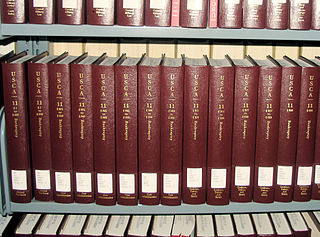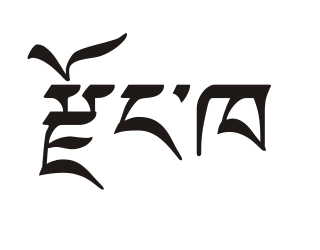
The Code of Laws of the United States of America is the official compilation and codification of the general and permanent federal statutes of the United States. It contains 53 titles. The main edition is published every six years by the Office of the Law Revision Counsel of the House of Representatives, and cumulative supplements are published annually. The official version of those laws not codified in the United States Code can be found in United States Statutes at Large.
In most common law jurisdictions, the attorney general or attorney-general is the main legal advisor to the government. The plural is attorneys general (traditional) or attorney generals.

The Government of Bhutan has been a constitutional monarchy since 18 July 2008. The King of Bhutan is the head of state. The executive power is exercised by the Lhengye Zhungtshog, or council of ministers, headed by the Prime Minister. Legislative power is vested in the bicameral Parliament, both the upper house, National Council, and the lower house, National Assembly. A royal edict issued on April 22, 2007 lifted the previous ban on political parties, ordering that they be created, in anticipation of National Assembly elections to be held the following year. In 2008, Bhutan adopted its first modern Constitution, codifying the institutions of government and the legal framework for a democratic multi-party system.
The Attorney General of Ireland is a constitutional officer who is the legal adviser to the Government and is therefore the chief law officer of the State. The Attorney General is not a member of the Government but does participate in cabinet meetings when invited and attends government meetings. The current Attorney General is Séamus Woulfe, SC.

Her Majesty's Advocate General for Scotland is one of the Law Officers of the Crown, whose duty it is to advise the Crown and Government of the United Kingdom on Scots law. The Office of the Advocate General for Scotland is a ministerial department of the United Kingdom government. The position is currently held by The Lord Keen of Elie QC, who is the first Conservative Advocate General.

The Government of Australia is the government of the Commonwealth of Australia, a federal parliamentary constitutional monarchy. It is also commonly referred to as the Australian Government, the Commonwealth Government, Her Majesty's Government, or the Federal Government.

Elections in Bhutan are conducted at national (Parliamentary) and local levels. Suffrage is universal for citizens 18 and over, and under applicable election laws. In national elections, political party participation is mainly restricted to the lower house of Parliament, and by extension, to the executive nominated by its majority.

The Bhutanese Royal Court of Justice is the government body which oversees the judicial system of Bhutan. Senior Judges of the courts are appointed by the monarch. Bhutan's legal system is influenced by English common law. The Royal Court of Justice is based in the capital Thimphu.

The judiciary of Somalia is defined by the Provisional Constitution of the Federal Republic of Somalia. It stipulates that the national court structure is to be organized into three tiers: the Constitutional Court, Federal Government level courts, and Federal Member State level courts. A future nine-member Judicial Service Commission is empowered to appoint any federal tier member of the judiciary. It also selects and presents potential Constitutional Court judges to the House of the People of the Federal Parliament for approval. If endorsed, the President then appoints the candidate as a judge of the Constitutional Court. The five-member Constitutional Court is likewise empowered to adjudicate issues pertaining to the constitution, in addition to various federal and sub-national matters.
The Attorney-General of the Republic of Singapore (AG) is the legal adviser to the Government of Singapore and the Public Prosecutor (PP). He carries out his functions with the assistance of his deputies, including the Deputy Attorney-General (DAG) and the Solicitor-General (SG), through the Attorney-General's Chambers (AGC). The current Attorney-General is Lucien Wong, SC.

The National Council is the upper house of Bhutan's new bicameral Parliament, which also comprises the Druk Gyalpo and the National Assembly. It is the subordinate house, and cannot author monetary or budget-related bills. Besides creating and reviewing Bhutanese legislation, the National Council acts as the house of review on matters affecting the security, sovereignty, or interests of Bhutan that need to be brought to the notice of the Druk Gyalpo, the Prime Minister and the National Assembly. Twenty members of the first Council were elected in the first ever elections for the Council held on December 31, 2007 and January 29, 2008.

The Parliament of Bhutan consists of the King of Bhutan together with a bicameral parliament. This bicameral parliament is made up of an upper house, the National Council and a lower house, the National Assembly. The current parliamentary framework replaced the unicameral Tshogdu in 2007, with the first members taking seats in 2008.

The judicial system of Bhutan is the purview of the Royal Court of Justice, the judicial branch of the government of Bhutan under the Constitution of 2008. The judicial system comprises the Judicial Commission, the courts, the police, the penal code, and regulations on jabmi (attorneys).

The law of Bhutan derives mainly from legislation and treaties. Prior to the enactment of the Constitution, laws were enacted by fiat of the King of Bhutan. The law of Bhutan originates in the semi-theocratic Tsa Yig legal code, and was heavily influenced through the twentieth century by English common law. As Bhutan democratizes, its government has examined many countries' legal systems and modeled its reforms after their laws.
The national symbols of Bhutan include the national flag, national emblem, national anthem, and the mythical druk thunder featured in all three. Other distinctive symbols of Bhutan and its dominant Ngalop culture include Dzongkha, the national language; the Bhutanese monarchy; and the driglam namzha, a seventeenth-century code on dress, etiquette, and dzong architecture. Natural symbols of Bhutan are its national flower, the Himalayan blue poppy; its national tree, the Himalayan cypress; its national bird, the raven; and its national animal, the takin.
The Local Government Act of Bhutan was enacted on September 11, 2009, by parliament of Bhutan in order to further implement its program of decentralization and devolution of power and authority. It is the most recent reform of the law on Bhutan's administrative divisions: Dzongkhags, Dungkhags, Gewogs, Chiwogs, and Thromdes (municipalities). The Local Government Act of Bhutan has been slightly amended in 2014.
Taxation in Bhutan is conducted by the national government and by its subsidiary local governments. All taxation is ultimately overseen by the Bhutan Ministry of Finance, Department of Revenue and Customs, which is part of the executive Lhengye Zhungtshog (cabinet). The modern legal basis for taxation in Bhutan derives from legislation. Several acts provide for taxation and enforcement only germane to their subject matter and at various levels of government, while a smaller number provide more comprehensive substantive tax law. As a result, the tax scheme of Bhutan is highly decentralized.







